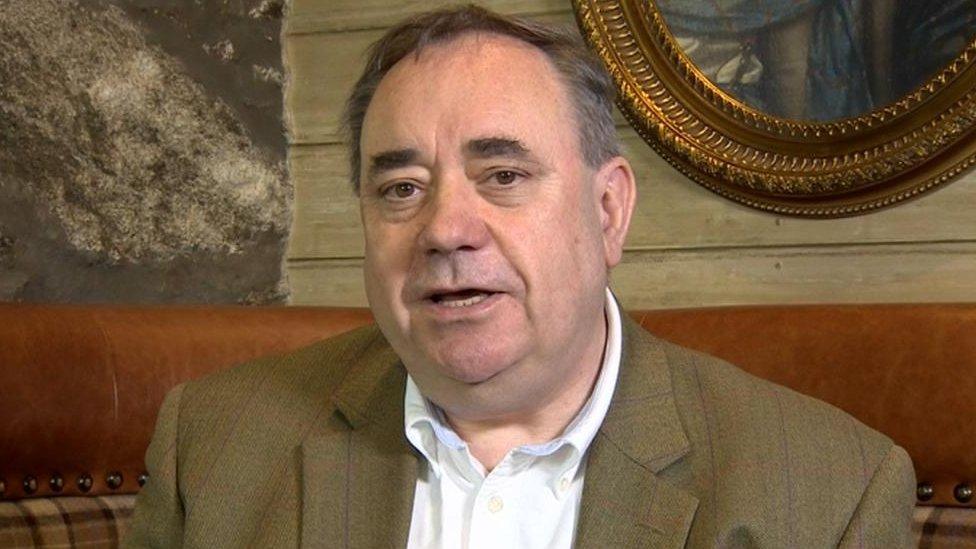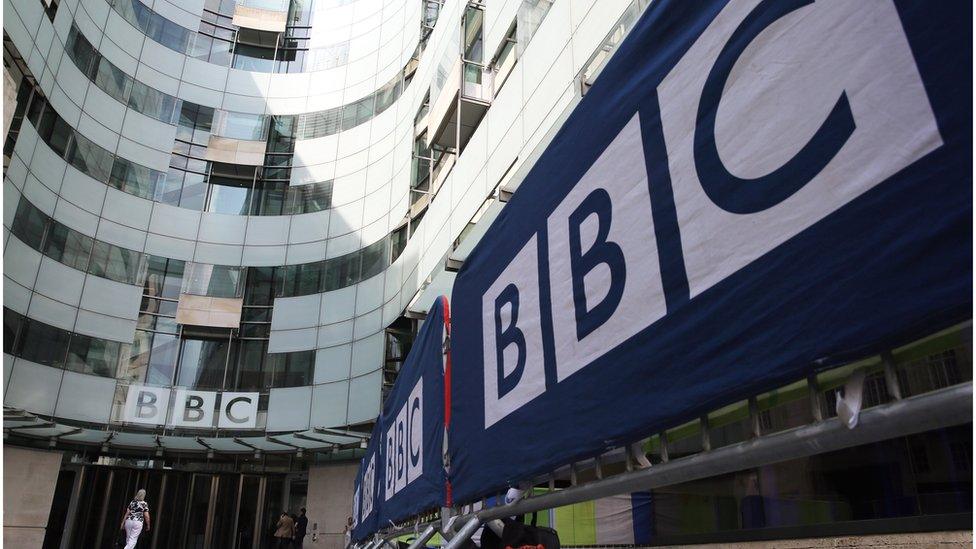Andrew Neil claims in Alex Salmond interview 'breached Ofcom rules'
- Published

Andrew Neil was the host of the Sunday Politics programme
Claims made by BBC presenter Andrew Neil during an interview with former SNP leader Alex Salmond breached Ofcom rules, the watchdog has ruled, external.
On the BBC's Sunday Politics programme, Mr Neil asked why one in five Scottish pupils were "functionally illiterate" when they left primary school.
Ofcom said the statement, made ahead of elections in 2017, was "materially misleading" for viewers.
Mr Neil had argued that the claim was "credible" and did not breach the rule.
Ofcom also criticised the BBC for its handling of the complaint.
'Positive destinations'
The programme was broadcast on 30 April, ahead of local elections in Scotland on 4 May and a UK general election on 8 June.
During the interview, Mr Neil twice asked Mr Salmond why one in five pupils who left primary school were "functionally illiterate".
In his replies, Mr Salmond highlighted that 93% of pupils leaving Scottish schools went to "positive destinations".

Mr Salmond highlighted the number of school leavers who went to positive destinations
After the programme was broadcast, a complaint was made to the BBC, querying the statistic and its source.
The corporation gave two different sources for the figure before the complaint was escalated to the BBC's Executive Complaints Unit (ECU), which agreed that the statement was not accurate.
It said the figure had come from a 2009 report, but that "it was not accurate to say that this allowed the conclusion quoted in the programme".
Published findings
The BBC added: "It should have been made clear that the phrase 'functionally illiterate' was not used in that report and that its source was the education spokeswoman of the Scottish Conservatives."
When it published its findings in November 2017, the ECU said that the 2009 survey "contained no reference to 'functional illiteracy', and no data which would have justified the claim in question".
The BBC and Mr Neil both provided responses to the Ofcom investigation into the case.
The corporation claimed that the inaccuracy was "not so materially misleading as to constitute a breach" of Ofcom's rules.
'Provocative way'
It also argued that the claim had not been treated as materially misleading by either Mr Salmond or First Minister Nicola Sturgeon.
Mr Neil said he had framed his question to Mr Salmond "in a provocative way to elicit a response that knocked my premise back".
He believed that neither Mr Salmond nor Ms Sturgeon had challenged the premise of his question because it was "all too credible, even if not exactly accurate, as I now realise".
And he rejected the suggestion that his question had seriously misled viewers about literacy problems in Scottish schools.

The BBC said it would study Ofcom's findings
However, Ofcom ruled that the claim was in breach of its rule that factual programmes "must not materially mislead the audience".
Ofcom said the audience would have had "particularly high expectations" about the accuracy of factual information in a BBC political interview.
"We considered that Andrew Neil misrepresented statistics on literacy among Scottish primary school children in a way that would have had the potential to affect negatively and erroneously viewers' understanding of educational standards in Scotland, at a time when those standards were being strongly debated during an election in that country," it said.
'Different explanations'
Ofcom also said it was "greatly concerned" about the BBC's handling of the case.
"At different stages of dealing with the complaint and during Ofcom's investigation, the BBC provided conflicting explanations on the source from which Andrew Neil's statement was derived.
"Notably, the BBC was still maintaining the accuracy of Andrew Neil's statement in its second substantive response to the complainant on 17 May 2017 and continued to provide different explanations on the source for Mr Neil's question at all the different stages of Ofcom's investigation.
"The length of time it took the BBC to admit there was no factual source to support Mr Neil's statement is deeply unsatisfactory and we expect better standards from the BBC, both in its handling of viewer complaints and in its interactions with Ofcom."
A spokesperson for the corporation said: "The BBC has already upheld a complaint on this issue in 2017 and we will study Ofcom's findings."